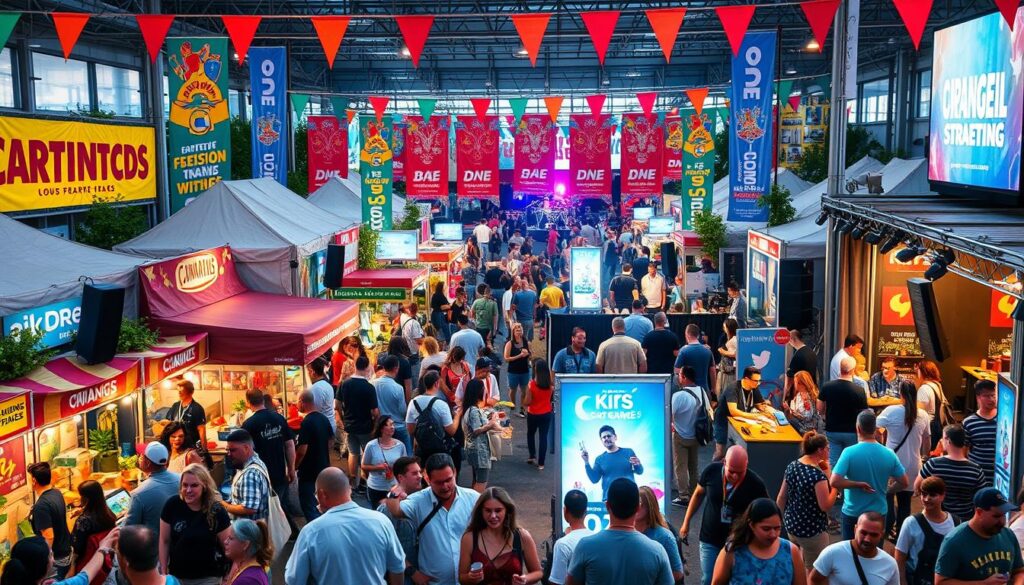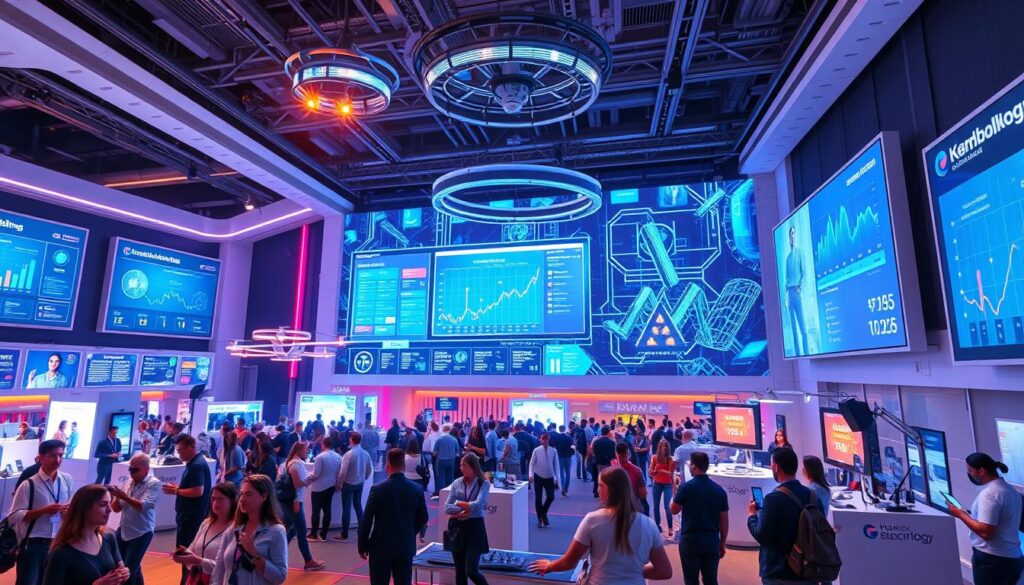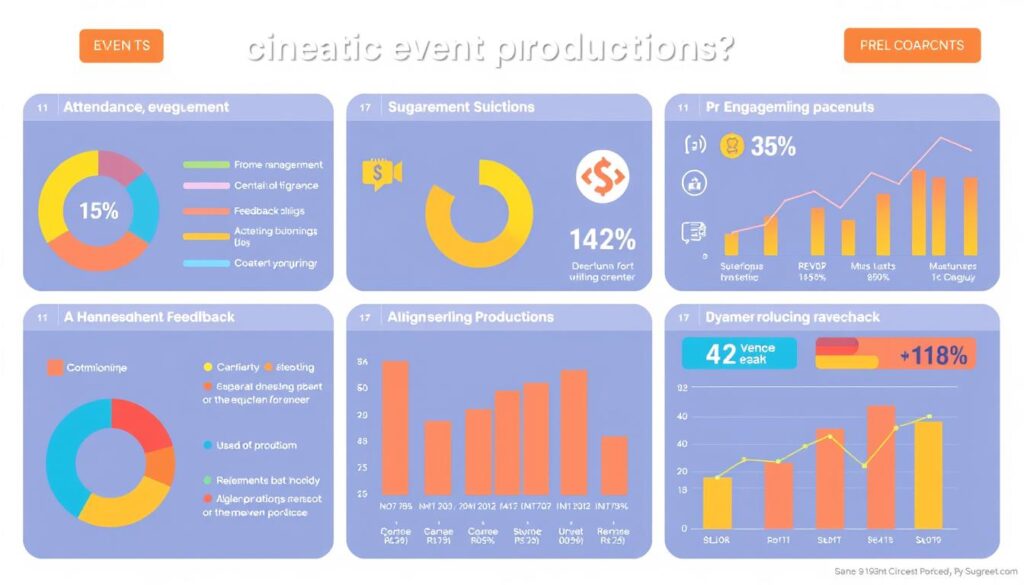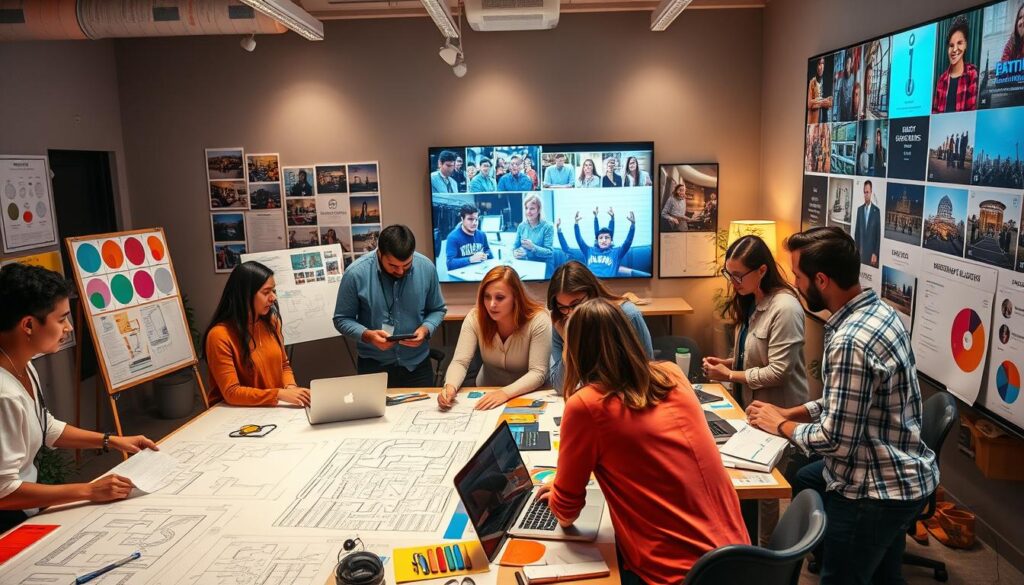Ever wonder what makes some event management services stand out? In the fast-paced world of event planning, a few companies consistently create unforgettable experiences. These experiences leave a lasting impact on everyone involved.
Successful Event Productions is more than just putting on an event. It's about making moments that people remember. We dive into the detailed strategies and fresh ideas that turn simple events into unforgettable ones.
Every event, whether it's a big corporate gala or a small wedding, comes with its own set of challenges. But it also offers chances to think creatively and solve problems. By understanding these challenges, we can achieve excellence in event planning.
Key Takeaways
- Strategic planning is key to a successful event
- Being flexible is essential for event success
- Knowing what your audience wants boosts engagement
- Technology can greatly improve event experiences
- Good relationships with vendors are vital for smooth events
- Measuring success means looking at all aspects of an event
Introduction to Successful Event Productions

Professional event planners create unforgettable experiences. They mix creativity, technical skills, and strategy. Today, events are key for brands to connect with people.
"Events are living stories that breathe life into organizational goals and vision."
Successful events need a few key things:
- Comprehensive strategic planning
- Innovative design concepts
- Seamless technical execution
- Audience-centric approach
Technology has changed how we produce events. Today's event pros use the latest tools to make experiences that go beyond usual. Virtual platforms, live streaming, and interactive mobile apps help events reach more people.
Some key tech for great events includes:
- Advanced event management software
- Real-time audience engagement platforms
- Hybrid event streaming capabilities
- Sophisticated audiovisual integration
Knowing how to produce events helps organizations make lasting memories. Whether it's a big conference or a small gathering, planning and creativity are key.
The Importance of Planning in Event Productions
Planning is key to a successful event. It turns a simple meeting into a memorable experience. Event planners know that good planning makes all the difference.
Good event planning is more than just setting up chairs. It's about making moments that people will remember. Here are some stats that show why planning is so important:
- Well-planned events can draw up to 30% more people.
- Good planning can cut costs by 15%.
- Events planned by pros make 90% of attendees happy.
Setting Clear Objectives
Your event's success starts with clear goals. Experts say to set specific, measurable goals that fit your organization's big picture. Think about what you want to achieve, who you're aiming for, and what messages you want to share.
Budgeting for Success
| Budget Category | Recommended Allocation |
|---|---|
| Venue | 30-40% |
| Catering | 20-25% |
| Marketing | 10-15% |
| Entertainment | 15-20% |
"Proper planning prevents poor performance." - Professional Event Management Wisdom
Scheduling and Timelines
A detailed timeline is your guide to success. Breaking down big tasks into smaller steps is part of the process. Create a timeline that covers:
- Initial planning phase
- Choosing vendors
- Marketing and promotion
- Final preparations
- The event itself
- Reviewing after the event
By following these planning tips, you can make your event unforgettable. It will meet and maybe even exceed everyone's expectations.
Building a Strong Team for Events
To create a top-notch event team, you need a solid plan and organization. The success of your event depends on the right people working well together.

Great event teams have clear roles and work together well. Their ability to communicate and coordinate is key to a successful event.
Defining Team Roles and Responsibilities
A good event team has different roles for complete coverage:
- Team Lead: Gives the overall vision and direction
- Content Owners: Take care of the venue, speakers, and program
- Creative Committee: Deals with media, marketing, and brand
- Operations Team: Handles technical stuff and logistics
- Finance Coordinator: Manages the budget and finances
Collaboration and Communication Strategies
Good event design and production need strong communication. Use:
- Regular team meetings
- Digital tools like Slack and Zoom
- Clear task assignments
- Feedback loops
"A high-performing team transforms individual talents into collective excellence." - Event Management Expert
Your event strategy should focus on teamwork, growth, and respect. Offer good pay, recognition, and fun team activities to boost performance and motivation.
Remember, a great team doesn't just run an event. They create unforgettable experiences that go beyond expectations.
Understanding Your Audience
Successful events start with knowing your audience well. Connecting with your guests is key to a great event. Understanding who they are helps create unforgettable experiences.

Conducting Target Audience Research
Getting to know your audience takes smart research. Here are some ways to learn about your event's guests:
- Use tools like Facebook Audience Insights
- Send out surveys and ask for feedback
- Look at data from past events
- Study market reports and trends
"Understanding your audience is not just about data – it's about creating connections that transform events into unforgettable experiences."
Creating Engaging Experiences
Creating great experiences is more than just gathering data. Your event strategy should use this info to design better events.
| Audience Characteristic | Engagement Strategy |
|---|---|
| Age Group 25-35 | Interactive digital networking platforms |
| Professional Sector | Tailored content tracks and expert panels |
| Technology Preference | Hybrid event formats with virtual participation options |
Pro tip: Personalization is key. Your event management services should focus on creating experiences that feel uniquely crafted for each attendee's needs and expectations.
Innovative Venue Selection
Choosing the right venue is key for event planners. It can make or break the event. A great venue turns a simple event into a memorable one.

Event planning companies know venue selection is more than finding a place. It's about creating a space that fits your event's theme and audience.
Factors to Consider When Choosing a Venue
- Capacity and spatial requirements
- Location accessibility
- Technical infrastructure
- Aesthetic appeal
- Cost-effectiveness
Venue Selection Strategies
Professional event planners suggest looking at unique spaces. These are more than just conference rooms. Here are some innovative options:
| Venue Type | Unique Characteristics |
|---|---|
| Historical Landmarks | Provide cultural heritage and memorable atmosphere |
| Art Galleries | Offer creative and inspiring environments |
| Industrial Spaces | Create urban, raw, and trendy settings |
| Rooftop Venues | Deliver panoramic views and open-air experiences |
"The right venue tells a story before the event even begins." - Event Design Expert
Technology and Sustainability Considerations
Today's event planning focuses on venues with:
- Advanced technological capabilities
- Sustainable practices
- Flexible booking policies
- Enhanced safety protocols
Your venue is more than a location—it's the canvas upon which your event's experience will be painted.
Marketing Strategies for Successful Events
Creating strong marketing plans is key to a successful event. How you promote your event can fill seats or leave them empty. It all starts with knowing how to connect with your audience.

Good marketing uses many channels to reach people. Here are some top strategies to boost your event's marketing:
Utilizing Social Media for Maximum Impact
- Create engaging content that builds anticipation
- Use targeted advertising to reach specific audience segments
- Leverage interactive features like live Q&As and polls
- Develop a unique event hashtag
Crafting Compelling Email Campaigns
Email is a strong tool in event marketing. Your campaign should be exciting, not just an invite.
| Email Strategy | Key Objectives |
|---|---|
| Personalization | Tailor messages to specific audience segments |
| Timing | Send strategic reminders and countdown emails |
| Value Proposition | Clearly communicate event benefits |
"Marketing is no longer about the stuff that you make, but about the stories you tell." - Seth Godin
Your event solutions should spark real interest. Focus on these key metrics for your marketing plan:
- Audience engagement rates
- Conversion tracking
- Social media interaction
- Email open and click-through rates
Successful event marketing tells a story that grabs your audience. Mix social media with targeted emails for the best results. This way, you'll make your event unforgettable.
Incorporating Technology in Events
Technology has changed how we plan events. It lets event planners make experiences that people will remember. Now, events use new digital tools to connect with people in exciting ways.

- Mobile event apps give personalized schedules
- Interactive tools engage people
- Advanced platforms for networking
- Live streaming lets more people join in
Event Apps and Engagement Tools
Event apps are key for making events interactive. They show that apps and platforms can share more personalized content by 50%. These tools help with:
- Talking to attendees in real time
- Interactive polls
- Digital networking
- Getting feedback right away
Live Streaming and Virtual Events
Virtual events reach more people. Live streaming lets events include remote viewers, making events more inclusive by up to 51%. Hybrid event models offer great experiences for both those there in person and online.
"Technology doesn't just support events—it transforms them into dynamic, interactive experiences." - Event Technology Expert
By using advanced digital tools, event planners can make events more engaging, accessible, and memorable. They connect with audiences in new and exciting ways.
Importance of Risk Management

Risk management is key to successful event planning. Knowing and preparing for possible problems can make or break an event. Event planners see risk assessment as a smart way to ensure events go smoothly.
"In the world of event productions, preparation is your greatest ally against unexpected disruptions." - Event Management Expert
For events to succeed, you need a solid plan to handle risks. Here are the main steps for managing risks well:
Identifying Possible Risks
- Do a SWOT Analysis to find weak spots
- Use PESTLE Analysis to look at big environmental risks
- Check past event data and reports
- Think about financial, legal, and safety risks
Creating Backup Plans
Having strong backup plans is vital for unexpected events. Your risk management plan should include:
- Building a crisis team
- Setting up clear communication plans
- Creating detailed backup plans for key event parts
- Knowing about full insurance coverage
Recent studies show 67% of event pros now focus on safety and security. By being proactive in risk management, you can turn problems into chances for creativity and great events.
Measuring Event Success

Understanding how to measure event success is key for your event planning company. Tracking key performance indicators (KPIs) gives you valuable insights. These insights can help improve future events.
Key Performance Indicators (KPIs) That Matter
Your event's success is more than just how many people show up. Here are important KPIs to look at:
- Registrant Conversion Rate
- Gross Revenue Generation
- Return on Investment (ROI)
- Social Media Engagement
- Attendee Satisfaction Scores
Strategic Feedback Collection
Gathering feedback from attendees is a must for your event planning company. Quality feedback makes future events better.
"Measurement is the first step that leads to control and eventually to improvement." - Harry Harwick
Use these methods to collect feedback:
- Post-event digital surveys
- Real-time mobile feedback platforms
- Interactive rating systems
- Social media sentiment analysis
By using these strategies, you'll get a deep understanding of what attendees think. This knowledge will help you make your events even better.
Learning from Past Events
Professional event planners know that getting better is key. They look back at past events to improve their plans. This helps them make future events even better.

Looking at past events helps find out what works and what doesn't. Good event planners learn from their experiences. They use a method to find important lessons.
Comprehensive Event Analysis Strategies
To learn from past events, event planners should focus on a few key areas:
- Collect detailed feedback from attendees
- Review event performance metrics
- Conduct team debriefing sessions
- Document key learnings and insights
Key Metrics for Event Evaluation
| Metric Category | Evaluation Focus | Improvement Potentia |
|---|---|---|
| Attendee Satisfaction | Survey Results | Enhanced Experience Design |
| Financial Performance | Budget Utilization | Cost Optimization |
| Engagement Levels | Interaction Metrics | Content and Format Refinement |
"In corporate event production, every event is an opportunity to learn and grow." - Industry Expert
By using a strategic approach to event analysis, you can keep getting better at producing corporate events. Data-driven insights are key to making events memorable and successful.
Implementing Future Improvements
- Review detailed event data
- Find specific areas for improvement
- Make plans to enhance
- Try out and refine new ideas
The best event planners see every event as a chance to learn and improve. They keep working on their skills and strategies to host top-notch corporate events.
Case Studies of Successful Event Productions
Looking at real event productions gives us valuable lessons. Event experts know that great events are more than just meetings. They are experiences that bring people and brands together in unforgettable ways.
The event world is full of creative ideas. These case studies show how to manage events in unique ways:
- Google's CES 2020 Assistant Launch: Used an interactive roller coaster
- Amazon's Intersect Festival: Mixed music, art, and tech, drawing 15,000 people
- YouTube Gaming's E3 Convention: Showcased brand with retro games
Notable Industry Examples
Event planners have changed how we think about events. They've brought new ways to engage people. Here are some examples of these new ideas:
| Company | Event Type | Innovative Strategy |
|---|---|---|
| Hulu | Huluween Drive-in Theater | Immersive haunted forest experience |
| Sonos | Brilliant Sound Experience | Interactive sound and music installations |
| Dating Advice Office | Experiential marketing with awkward conversation spaces |
Lessons Learned
Creative event solutions mean thinking outside the box. Key takeaways are:
- Focus on making events interactive
- Use tech to make experiences more real
- Make events tell a story that shows off your brand
"Great events are not just planned—they are crafted experiences that resonate with participants long after the moment has passed."
By learning from these examples, you can create events that truly connect with your audience.
Conclusion: The Future of Event Productions
The world of event design and production is changing fast. New technologies and what people want are driving these changes. To keep up, it's key to know the latest trends.
Managing event logistics now means being smart and flexible. You need to use digital tools and focus on people's experiences.
Technology is changing how we plan and run events. Virtual and hybrid events are getting better, making experiences more real than ever. You should use the latest tech like AI and virtual reality to make events unforgettable.
Trends to Watch
Going green is now a must in event production. People want events that are good for the planet. You can show you care by using eco-friendly practices and working with green suppliers.
Embracing Change in Events
The future of event management is about making real connections in a digital world. Success comes from mixing new tech with real human moments. Stay open to new ideas, learn always, and listen to what people want. This way, you'll create events that change lives.
FAQ
What makes a successful event production?
A successful event needs careful planning and a great team. Knowing your audience and choosing the right venue are key. Marketing well and using technology also help.
It's important to have clear goals and do thorough research. Creating engaging experiences and being ready for surprises are also essential.
How important is technology in modern event productions?
Technology is very important today. Virtual events are now more popular, with 75% of planners seeing more people attend. Tools like event apps and live streaming make events better.
They help people connect and make events more accessible. This technology improves the experience for everyone.
How can I reduce costs when hosting an event?
Virtual events can save a lot of money, up to 40-60% less than in-person ones. Using digital platforms and cutting down on venue and travel costs helps. This way, you can have a great event without spending too much.
What are the benefits of virtual events?
Virtual events have many advantages. They can attract more people and save money. They also help the environment by reducing carbon emissions by up to 94%.
Marketers find them successful for lead generation, and attendees are usually happy. This makes virtual events a smart choice.
How do I measure the success of my event?
To see if your event was a success, look at things like how many people attended and how engaged they were. Also, check if you got any leads and if people were happy with their experience.
For virtual events, track how people interacted and if they converted. Getting feedback from participants helps you know what to improve next time.
What are the key considerations for venue selection?
When picking a venue, think about how many people it can hold, its location, and how easy it is to get to. Make sure it fits with what you want to achieve with your event.
For virtual events, focus on creating a digital space that feels real. This will make your event feel more like a real event to your attendees.
How can I create an engaging event experience?
To make your event engaging, know who your audience is and tailor your content to them. Add interactive parts like live Q&As and polls. Use social media and email to get people excited.
Make sure your event meets what your attendees want. This will keep them interested and happy.
What are the emerging trends in event productions?
New trends include more virtual and hybrid events, using AI and VR, focusing on being green, and making sure attendees have a great time. To succeed, event planners need to keep up with these changes and be open to new ideas.





